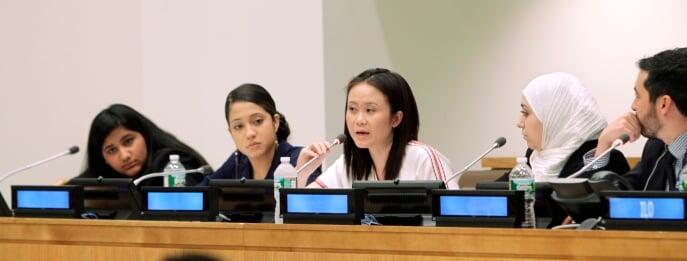UNITED NATIONS, New York – Young people achieve “eyeball-to-eyeball accountability” when they are included at the negotiating table, according to UNFPA Deputy Executive Director Kate Gilmore, at a side event of the UN Commission on Population and Development. Contributions to the recently published ICPD Global Review have been of the highest quality when young people have been involved, she said.
Youth participants took centre stage at the event, where they joined international leaders and experts to discuss how young people can be actively engaged in fulfilling the Cairo agenda. The visionary and groundbreaking Programme of Action was adopted at the International Conference on Population and Development (ICPD) 20 years ago.
Hosted by the Ministry of Foreign Affairs of the Netherlands, Choice for Youth and Sexuality, and Dance4Life – two organizations that promote and support the sexual and reproductive health and rights of young people – the event also featured speakers from the Youth Coalition and International Planned Parenthood Federation (IPPF).
Turning theory into practice
Four of the six speakers were under the age of 35, and all stood out for their passion and commitment to enabling young people to participate meaningfully in the decisions and processes that will ultimately affect them.
Ms. Nur Hidayati Handayani, an advocate from the Youth Coalition for Sexual and Reproductive Rights, spoke about the commitment that the government of Indonesia had shown to young people and to the ICPD.
But turning commitment into action remains the primary goal and challenge.
Ms. María José Rivas Vera, a youth representative for IPPF, highlighted the difficulties countries face when translating the theory of youth participation into reality on the ground. She pointed to the constitution of her own organization as a good example because youth participation is included at all levels of governance, from decisions about programming to implementation on the ground.
Building on this point, Mr. Stephen Diaz of the Youth Coalition for Sexual and Reproductive gave a compelling account of the challenges facing young people in the Caribbean.
Making a meaningful investment in youth
Mr. Lambert Grijns, Dutch Ambassador for Sexual and Reproductive Health and Rights & HIV/AIDS and Director of the Social Development Department at the Ministry of Foreign Affairs, spoke to the issue and gave valuable insight into why and how the Netherlands started to take youth issues seriously.
“We are investing in youth participation because it makes sense,” he said, outlining the ways in which the Dutch government works with delegations from schools and universities, and sets up mentorship programmes between young people and civil servants.
“Sometimes when I am stuck on a problem at work, I talk to my children and ask them what the solution is. I offer them options A, B and C, and they will always find the real solution, which is option D,” he added.
And the world is more than ever in need of an “option D”, reiterated Ms. Gilmore.
In an impassioned closing statement, she summed up the importance of allowing young people to be meaningfully engaged.
“How can young people be too young to drive but old enough to be pregnant; old enough to be raped but too young to have contraception; too young for comprehensive sexuality education but old enough to be married?”
“Young people are being locked out and they are paying for it with their lives,” she added. “Power must shift urgently. Young people should be ensuring that we are held accountable.”



